八下英语单元笔记
英语八年级下册第五单元笔记
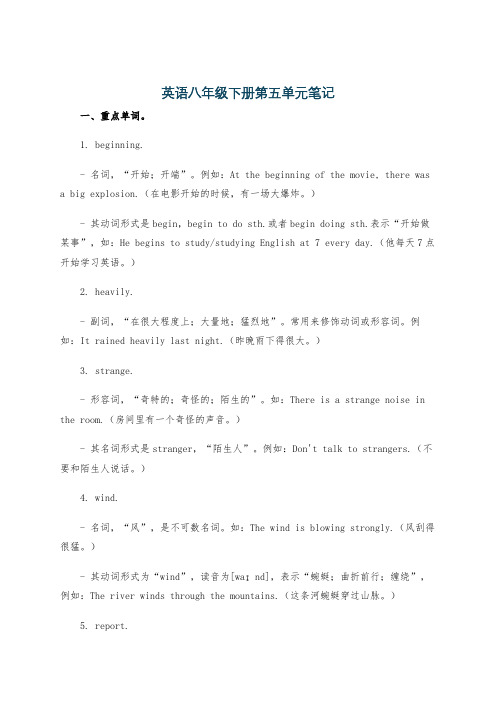
英语八年级下册第五单元笔记一、重点单词。
1. beginning.- 名词,“开始;开端”。
例如:At the beginning of the movie, there was a big explosion.(在电影开始的时候,有一场大爆炸。
)- 其动词形式是begin,begin to do sth.或者begin doing sth.表示“开始做某事”,如:He begins to study/studying English at 7 every day.(他每天7点开始学习英语。
)2. heavily.- 副词,“在很大程度上;大量地;猛烈地”。
常用来修饰动词或形容词。
例如:It rained heavily last night.(昨晚雨下得很大。
)3. strange.- 形容词,“奇特的;奇怪的;陌生的”。
如:There is a strange noise in the room.(房间里有一个奇怪的声音。
)- 其名词形式是stranger,“陌生人”。
例如:Don't talk to strangers.(不要和陌生人说话。
)4. wind.- 名词,“风”,是不可数名词。
如:The wind is blowing strongly.(风刮得很猛。
)- 其动词形式为“wind”,读音为[waɪnd],表示“蜿蜒;曲折前行;缠绕”,例如:The river winds through the mountains.(这条河蜿蜒穿过山脉。
)5. report.- 名词,“报告;报道”。
例如:I read a report about the accident in the newspaper.(我在报纸上读到了一篇关于这个事故的报道。
)- 动词,“报道;公布”。
如:The journalist reported the news on TV.(这位记者在电视上报道了这条新闻。
八年级下册第六单元英语笔记
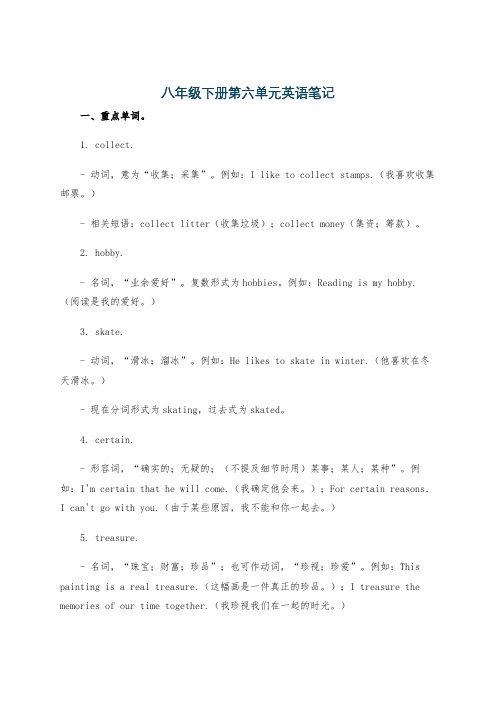
八年级下册第六单元英语笔记一、重点单词。
1. collect.- 动词,意为“收集;采集”。
例如:I like to collect stamps.(我喜欢收集邮票。
)- 相关短语:collect litter(收集垃圾);collect money(集资;筹款)。
2. hobby.- 名词,“业余爱好”。
复数形式为hobbies。
例如:Reading is my hobby.(阅读是我的爱好。
)3. skate.- 动词,“滑冰;溜冰”。
例如:He likes to skate in winter.(他喜欢在冬天滑冰。
)- 现在分词形式为skating,过去式为skated。
4. certain.- 形容词,“确实的;无疑的;(不提及细节时用)某事;某人;某种”。
例如:I'm certain that he will come.(我确定他会来。
);For certain reasons, I can't go with you.(由于某些原因,我不能和你一起去。
)5. treasure.- 名词,“珠宝;财富;珍品”;也可作动词,“珍视;珍爱”。
例如:This painting is a real treasure.(这幅画是一件真正的珍品。
);I treasure the memories of our time together.(我珍视我们在一起的时光。
)6. island.- 名词,“岛”。
例如:There is a beautiful island in the sea.(海里有一个美丽的岛。
)7. page.- 名词,“(书刊或纸张的)页;面;张”。
例如:Turn to page 10.(翻到第10页。
)8. hurry.- 动词,“匆忙;赶快”;名词,“匆忙;急忙”。
- 常用短语:hurry up(赶快;急忙(做某事));in a hurry(匆忙地;急于)。
例如:Hurry up, or we'll be late.(快点,否则我们要迟到了。
八下英语八单元2b笔记

八下英语八单元2b笔记
八下英语八单元2b笔记
本单元的主题是“文化之旅”。
我们将学习关于不同国家和地区的文化、风俗和名胜古迹的知识。
以下是我们在本单元学到的一些重点内容:
1. 文化差异:我们学习了不同国家和地区的文化差异。
例如,中国人在过年时会贴春联、放鞭炮,而西方国家则会在圣诞节时装饰圣诞树、交换礼物。
了解这些文化差异有助于我们更好地理解和尊重他人的文化。
2. 风俗习惯:我们了解了不同国家和地区的风俗习惯。
例如,在英国的下午茶时间,人们会品尝茶和小点心,而在日本,人们在温泉中泡澡,被认为是一种放松和净化身心的方式。
3. 名胜古迹:我们学习了一些世界著名的名胜古迹。
例如,埃及的金字塔、巴黎的埃菲尔铁塔和巴西的基督像等。
通过学习这些名胜古迹,我们可以了解到世界各地的历史和文化。
4. 旅游经验:我们学习了如何进行一次顺利的旅行。
从选择目的地、预订机票和酒店,到了解当地的交通和食物,我们掌握了一些旅游经
验,可以帮助我们在旅行中更好地适应和享受。
通过学习本单元的内容,我们不仅扩展了自己的知识面,还培养了对不同文化的尊重和理解。
希望我们能够将这些知识应用到实际生活中,与世界各地的人们更好地交流和合作。
八年级下册人教版英语笔记

八年级下册人教版英语笔记一、Unit 1 What's the matter?1. 重点单词。
- matter:n. 问题;事情。
常用搭配:What's the matter (with sb.)? = What's wrong (with sb.)? = What's the trouble (with sb.)?(某人)怎么了?- sore:adj. 疼痛的;酸痛的。
例如:a sore throat喉咙痛。
- stomachache:n. 胃痛;腹痛。
- foot:n. 脚;足。
复数形式是feet。
- neck:n. 脖子;颈部。
- fever:n. 发烧。
have a fever发烧。
- lie:v. (lay - lain)躺;平躺。
lie down躺下。
- rest:v. & n. 放松;休息。
take breaks/take a break = have a rest休息。
- cough:v. & n. 咳嗽。
have a cough咳嗽。
- toothache:n. 牙痛。
2. 重点短语。
- have a cold:感冒。
- have a stomachache:胃痛。
- lie down and rest:躺下休息。
- drink some hot tea with honey:喝些加蜂蜜的热茶。
- see a dentist:看牙医。
- get an X - ray:拍X光片。
- take one's temperature:量体温。
3. 重点句型。
- What should I do? 我应该做什么?- You should see a dentist and get an X - ray. 你应该去看牙医并拍X光片。
- Should I put some medicine on it? 我应该在上面敷些药吗?- Yes, you should. / No, you shouldn't. 是的,你应该。
八年级下册英语u1笔记
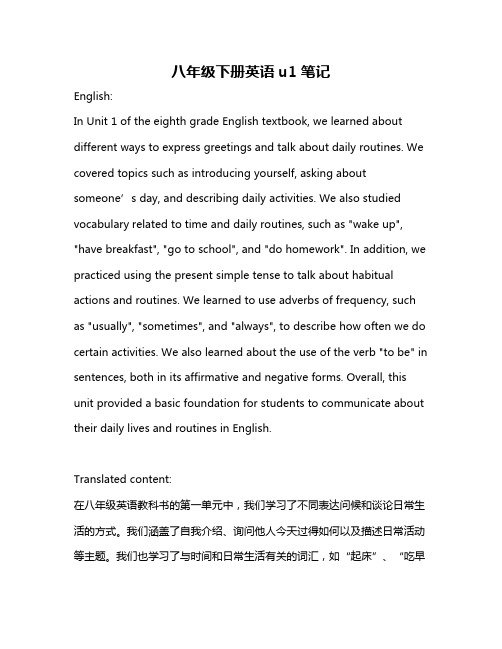
八年级下册英语u1笔记English:In Unit 1 of the eighth grade English textbook, we learned about different ways to express greetings and talk about daily routines. We covered topics such as introducing yourself, asking about someone’s day, and describing daily activities. We also studied vocabulary related to time and daily routines, such as "wake up", "have breakfast", "go to school", and "do homework". In addition, we practiced using the present simple tense to talk about habitual actions and routines. We learned to use adverbs of frequency, such as "usually", "sometimes", and "always", to describe how often we do certain activities. We also learned about the use of the verb "to be" in sentences, both in its affirmative and negative forms. Overall, this unit provided a basic foundation for students to communicate about their daily lives and routines in English.Translated content:在八年级英语教科书的第一单元中,我们学习了不同表达问候和谈论日常生活的方式。
八年级英语下册第三单元笔记

八年级英语下册第三单元笔记一、重点单词。
1. rubbish.- n. 垃圾;废弃物。
例如:There is a lot of rubbish on the street.(街道上有很多垃圾。
)2. fold.- v. 折叠;对折。
如:Fold the paper in half.(把纸对折。
)3. sweep.- v. (swept, swept) 扫;打扫。
例如:I sweep the floor every day.(我每天扫地。
)4. floor.- n. 地板;地面。
如:The book is on the floor.(书在地板上。
)5. mess.- n. 杂乱;不整洁。
例如:What a mess!(多么杂乱啊!)6. throw.- v. (threw, thrown) 扔;掷。
例如:Don't throw rubbish everywhere.(不要到处扔垃圾。
)7. neither.- adv. 也不。
用于否定句中,表示前面所说的情况也适用于后者。
例如:He doesn't like apples, neither do I.(他不喜欢苹果,我也不喜欢。
)- pron. 两者都不。
例如:Neither of them is right.(他们两个都不对。
)8. shirt.- n. 衬衫。
如:This is a white shirt.(这是一件白色的衬衫。
)9. pass.- v. 给;递;走过;通过。
例如:Pass me the salt, please.(请递给我盐。
);He passed the exam.(他通过了考试。
)10. borrow.- v. 借;借用。
例如:Can I borrow your pen?(我能借用你的钢笔吗?)11. lend.- v. (lent, lent) 借给;借出。
例如:I can lend you some money.(我可以借给你一些钱。
英语八年级下册第6单元笔记
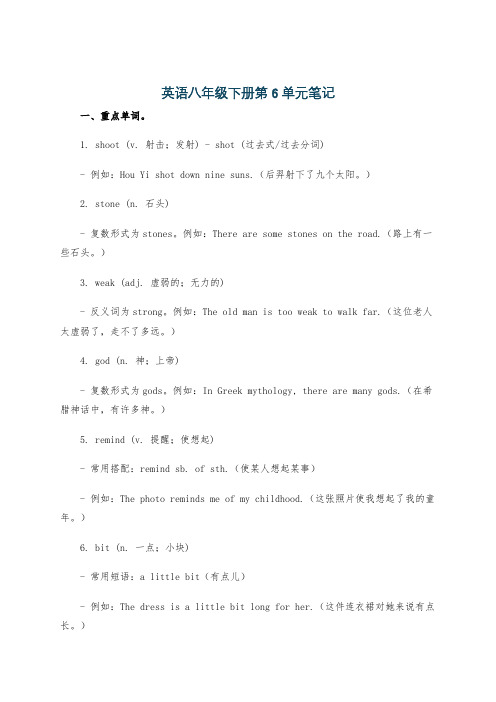
英语八年级下册第6单元笔记一、重点单词。
1. shoot (v. 射击;发射) - shot (过去式/过去分词)- 例如:Hou Yi shot down nine suns.(后羿射下了九个太阳。
)2. stone (n. 石头)- 复数形式为stones。
例如:There are some stones on the road.(路上有一些石头。
)3. weak (adj. 虚弱的;无力的)- 反义词为strong。
例如:The old man is too weak to walk far.(这位老人太虚弱了,走不了多远。
)4. god (n. 神;上帝)- 复数形式为gods。
例如:In Greek mythology, there are many gods.(在希腊神话中,有许多神。
)5. remind (v. 提醒;使想起)- 常用搭配:remind sb. of sth.(使某人想起某事)- 例如:The photo reminds me of my childhood.(这张照片使我想起了我的童年。
)6. bit (n. 一点;小块)- 常用短语:a little bit(有点儿)- 例如:The dress is a little bit long for her.(这件连衣裙对她来说有点长。
)7. silly (adj. 愚蠢的;不明事理的)- 例如:It's silly of you to do such a thing.(你做这样的事很愚蠢。
)8. object (n. 物体;物品)- 例如:There are many strange objects in the museum.(博物馆里有许多奇怪的物品。
)二、重点短语。
1. once upon a time.- 意为“从前”,常用于故事的开头。
例如:Once upon a time, there was a beautiful princess.(从前,有一位美丽的公主。
八下英语第三单元笔记
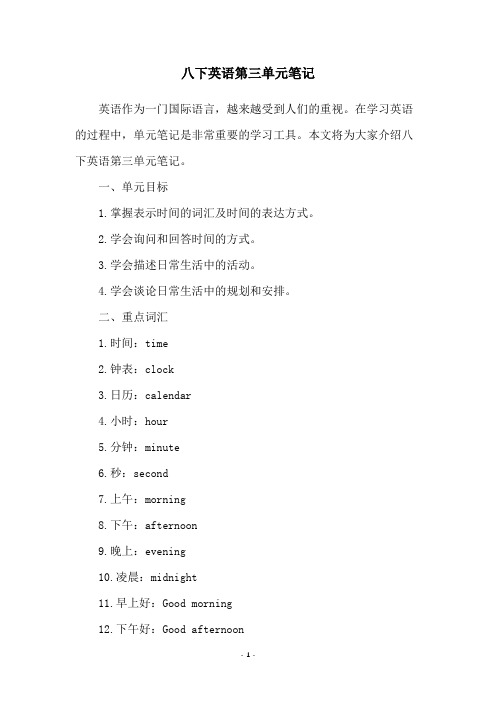
八下英语第三单元笔记英语作为一门国际语言,越来越受到人们的重视。
在学习英语的过程中,单元笔记是非常重要的学习工具。
本文将为大家介绍八下英语第三单元笔记。
一、单元目标1.掌握表示时间的词汇及时间的表达方式。
2.学会询问和回答时间的方式。
3.学会描述日常生活中的活动。
4.学会谈论日常生活中的规划和安排。
二、重点词汇1.时间:time2.钟表:clock3.日历:calendar4.小时:hour5.分钟:minute6.秒:second7.上午:morning8.下午:afternoon9.晚上:evening10.凌晨:midnight11.早上好:Good morning12.下午好:Good afternoon13.晚上好:Good evening14.昨天:yesterday15.今天:today16.明天:tomorrow三、语法要点1.表示时间的基本语法结构:时间+动词例如:What time do you get up?I get up at 7:00.2.表示时间的特殊语法结构:动词+时间例如:I have lunch at 12:00.3.使用介词表示时间:at表示具体时间点,例如:at 8:00in表示一段时间,例如:in the morning on表示特定日期,例如:on Monday四、对话模板1.询问时间A: Excuse me, what time is it?B: It's 3:30.2.回答时间A: What time is it?B: It's 6:45.3.询问活动时间A: What time do you have breakfast? B: I have breakfast at 7:00.4.回答活动时间A: What time do you have lunch?B: I have lunch at 12:00.五、常用句型1.时间的表达方式What time is it?It's 8 o'clock.2.询问活动时间What time do you have breakfast?I have breakfast at 7:00.3.描述活动的时间I have lunch at 12:00.4.谈论日常生活安排What are you going to do tomorrow? I'm going to visit my grandparents.六、学习建议1.掌握时间的表达方式。
- 1、下载文档前请自行甄别文档内容的完整性,平台不提供额外的编辑、内容补充、找答案等附加服务。
- 2、"仅部分预览"的文档,不可在线预览部分如存在完整性等问题,可反馈申请退款(可完整预览的文档不适用该条件!)。
- 3、如文档侵犯您的权益,请联系客服反馈,我们会尽快为您处理(人工客服工作时间:9:00-18:30)。
Unit 1 What’s the matter 重点短语、句式1. have a fever 发烧2. have a cough 咳嗽3. have a cold 受凉;感冒4. have a headache 头痛5. have a toothache 牙疼6. have a stomachache 胃疼7. have a sore throat 喉咙痛8. have a sore back 背疼9. talk too much 说得太多10. drink enough water 喝足够的水11. hot tea with honey 加蜂蜜的热茶12. see a dentist 看牙医13. get an X-ray 拍X 光片14. take one’ s temperature 量体温15. put some medicine on sth. 在……上面敷药16. feel very hot 感到很热17. sound like 听起来像18. all weekend 整个周末19. in the same way 以同样的方式20. go to a doctor 看医生21. go along 沿着……走22. on the side of the road 在马路边23. shout for help 大声呼救24. without th inking twice 没有多想25. get off 下车26. have a heart problem 有心脏病27. to one’ s surprise使... 某人惊讶/出乎某人意料的28. thanks to 多亏了;由于;幸亏29. in time 及时30. save a life 挽救生命31. get into trouble 造成(陷入)麻烦32. right away 立刻;马上33. because of 由于34. get out of 离开;从……出萍35. hurt oneself 受伤36. put a bandage on sth. 用绷带包扎37. fall down 摔倒38. feel sick 感到恶心39. have a nosebleed 流鼻血40. cut his knee 割伤他的膝盖41. put her head back 把她的头向后仰42. have problems breathing 呼吸困难43. mountain climbing 登山运动44. be used to doing sth. 习惯做某事45. run out (of) 用完;用尽46. so that 以便.;目的是…47. so. . . that 如此… …以至于…48. be in control of 掌管;管理49. in a difficult situation 在险境屮50. keep on doing sth. 继续或坚持做某事51. make decisions 做出决定52. take risks 冒险53. give up doing sth 放弃做某事54. lie down and rest 躺下来休息55.(go to) see a doctor(去)看病to do sth. 需要做某事to do sth. 同意做某事agree with sb.同意某人(观点或看法)breaks 休息59. wait for 等待60. think about 考虑61. cut off 切除62. be interest in 对…感兴趣。
63. the same as… 和…一样…64. away from…远离…65. see sb. do sth.看见某人做某事过程see sb. doing sth.看见某人正在做某事66. be good for 对..有好处67. at least 至少68. in front of 在…前面69. used to +v. 过去常常* be used to+ 或n. 习惯于*look forward to + 盼望做某事*pay attention to + 专心作某事70. What’s the matterWha t’ s the matter with you= What’s the trouble w ith you= Wha t’ s wrong with youUnit 2 I’ll help to clean up the city parks.一、重点短语1. Clean-Up Day 清洁日2. an old people’s home 养老院3. help out with sth. 帮助解决困难4. used to 曾经… 过去常常5. care for 关心;照顾6. the look of joy 快乐的表情7. at the age of 在......岁时up 打扫(或清除)干净9. cheer up (使)变得更高兴;振奋10. give out 分发;散发11. come up with 想出;提出12. make a plan 制订计划13. make some notices 做些公告牌14. try out 试用;试行15. work for 为…工作;为….效力16. put up 建造;举起;张贴put off 推迟;延迟put away 收起来、放好put out 熄灭put on 穿上put down 放下put in 提出,放入,插入17. hand out 分发;散发;发给18. call up 打电话;召集19. be satisfaction with sb.对某人感到满意20. look up 查阅(字典资料中)21. raise money 筹钱;募捐22. take after 与......相像;像23. give away 赠送;捐赠give up 放弃give sb. sth.给某人某物。
=give sth. to sb.24. fix up 修理;修补;解决25. be similar to 与……相似26. set up 建立;设立27. disabled people 残疾人28. make a difference 影响;有作用29. be able to 能够30. after-school reading program课外阅读项目as 比如(多个名词或短语例子)forexample 比如(一个例句)once 立刻,马上=right awayalone 独自居住lonely 感到寂寞to do sth. 决定做某事true 成为现实;实现the same time 同时38. work out 可以解决,作出,39. run out (of sth.)用完;耗尽某物(thank you) for doing 感谢某人做某事二、重点句式1. take (goo d) care of …照顾、保管。
主要指照顾照料好物品和动物等方面的照顾。
look after…(well)照顾、保管。
主要指对人在生活方面的照顾和料理。
care for :照顾2、for example 例如:举“一个”句子为例,作插入语,用逗号隔开,可置于句首、句中、句末;such as 比如:举“几个”名词或名词短语的例子,但不是全部,可和and so on连用,可分开使用such...as...;like表示列举,可和such as互换。
3、㈠hope :可以实现的希望句式:①hope to do 例:We hope to see you again.②hope that+从句例:I hope you can help me with my maths.③hope for + n. 例:I hope for success .注意:hope不能直接接宾语。
例:hope sb. to do(错误)㈡wish 难以实现的希望或表示良好的祝愿(不能用hope表祝愿)句式:①wish (sb.) to doI wish you to be happy②wish sb./sth. +n.I wish you successI wish you a pleasant journey .③wish that +从句I wish I could fly like a bird.Unit 3 Could you please clean your room 一、重点短语out for dinner 出去吃饭out late 在外面待到很晚to the movies 去看电影a ride 搭车on 从事doing sth. 完成做某事and tid y 干净整洁the dishes 洗餐具out the rubbish 倒垃圾take out 取出take up 占用take away 带走take off 起飞your/the clothes 叠衣服the floor 扫地your/the bed 整理床铺the livng room 打扫客厅problem 没问题sb. 欢迎某人home from school/ work 放学/下班回家down 扔下、抛弃away 扔掉、浪费sth. to sb. 向某人扔某物over 过来sb. for a walk 带某人去散步out for a walk 出去散步23. as a result 结果、因此the time 一直;总是day/evening 整曰/夜housework 做家务back 大声回应away 走开the housework 分担家务comfortable home 一个舒适的家surprise 惊讶地something to drink拿点喝的东西one show 观看一个节目out 闲逛sb. sth. 把某物传给某人sth. wet 使某物弄湿doing/to do sth. 讨厌做某事chores 做杂务sb. (to ) d o /with sth帮助某人干某事a tent带顶帐篷来to the store去商店sb. to a party邀请某人参加聚会sb. do sth. 使某人做某事stress足够的压力of time浪费时间order to为了;目的是..good grades取得好成绩(not) doing sth. (不)介意做某事on依赖;依靠children’ s independence发展孩子的独立性after/take care of 照顾;照看one’ s part in (doing ) sth.做某人分内的事主语人借进。
